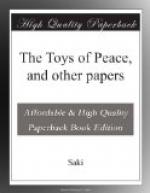“I wasn’t thinking of anything of the sort,” said the Wanderer; “I was thinking of the tendency that modern war has to destroy and banish the very elements of picturesqueness and excitement that are its chief excuse and charm. It is like a fire that flares up brilliantly for a while and then leaves everything blacker and bleaker than before. After every important war in South-East Europe in recent times there has been a shrinking of the area of chronically disturbed territory, a stiffening of the area of chronically disturbed territory, a stiffening of frontier lines, an intrusion of civilised monotony. And imagine what may happen at the conclusion of this war if the Turk should really be driven out of Europe.”
“Well, it would be a gain to the cause of good government, I suppose,” said the Merchant.
“But have you counted the loss?” said the other. “The Balkans have long been the last surviving shred of happy hunting-ground for the adventurous, a playground for passions that are fast becoming atrophied for want of exercise. In old bygone days we had the wars in the Low Countries always at our doors, as it were; there was no need to go far afield into malaria-stricken wilds if one wanted a life of boot and saddle and licence to kill and be killed. Those who wished to see life had a decent opportunity for seeing death at the same time.”
“It is scarcely right to talk of killing and bloodshed in that way,” said the Merchant reprovingly; “one must remember that all men are brothers.”
“One must also remember that a large percentage of them are younger brothers; instead of going into bankruptcy, which is the usual tendency of the younger brother nowadays, they gave their families a fair chance of going into mourning. Every bullet finds a billet, according to a rather optimistic proverb, and you must admit that nowadays it is becoming increasingly difficult to find billets for a lot of young gentlemen who would have adorned, and probably thoroughly enjoyed, one of the old-time happy-go-lucky wars. But that is not exactly the burden of my complaint. The Balkan lands are especially interesting to us in these rapidly-moving days because they afford us the last remaining glimpse of a vanishing period of European history. When I was a child one of the earliest events of the outside world that forced itself coherently under my notice was a war in the Balkans; I remember a sunburnt, soldierly man putting little pin-flags in a war-map, red flags for the Turkish forces and yellow flags for the Russians. It seemed a magical region, with its mountain passes and frozen rivers and grim battlefields, its drifting snows, and prowling wolves; there was a great stretch of water that bore the sinister but engaging name of the Black Sea—nothing that I ever learned before or after in a geography lesson made the same impression on me as that strange-named inland sea, and I don’t think its magic has ever faded out of my imagination.




